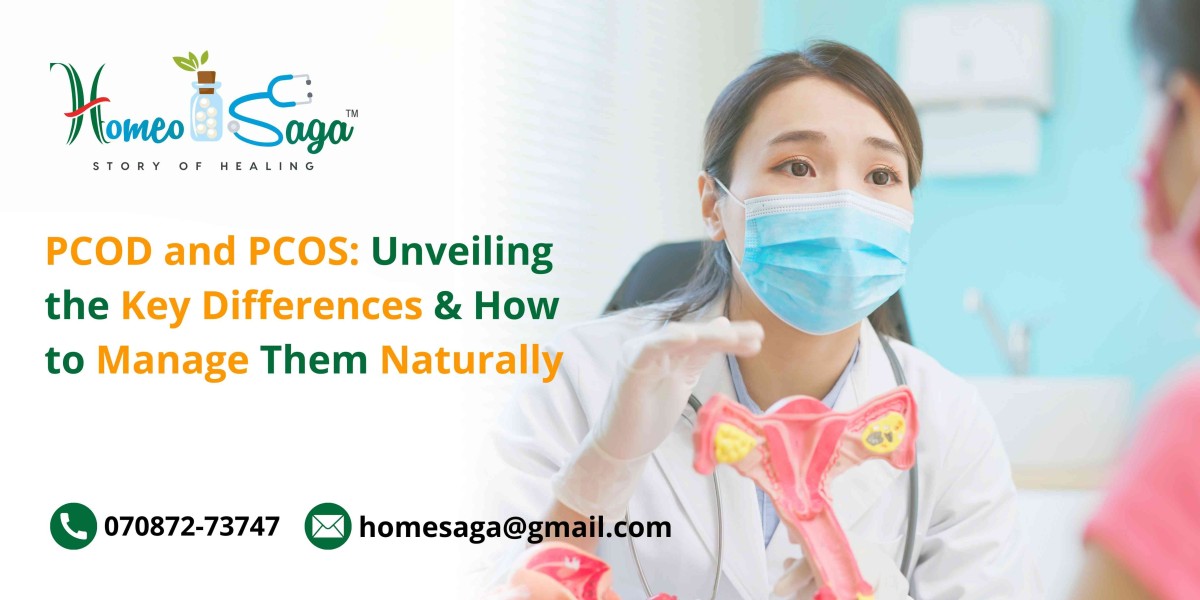Polycystic Ovarian Disease (PCOD) and Polycystic Ovary Syndrome (PCOS) are two hormonal disorders that can significantly impact women's health. Despite their similar names, they are distinct conditions with unique symptoms and implications. Understanding these differences is crucial for effective management. This blog will explore the characteristics of PCOD and PCOS, their symptoms, and natural strategies for managing these conditions.
What is PCOD?
PCOD, or Polycystic Ovarian Disease, primarily involves the formation of multiple small cysts on the ovaries. This condition can disrupt hormonal balance and lead to various symptoms. While PCOD can affect menstrual regularity and emotional health, its symptoms are generally less severe than those of PCOS.
Common Symptoms of PCOD
- Irregular Menstrual Cycles: Women may experience missed periods or unusually long cycles.
- Weight Gain: Many women struggle with weight management.
- Skin Issues: Acne and oily skin can occur due to hormonal fluctuations.
- Mood Swings: Emotional fluctuations are common.
Causes of PCOD
The exact causes of PCOD remain unclear but may include:
- Hormonal Imbalances: Disruptions in insulin and androgens play a significant role.
- Genetic Factors: Family history can increase susceptibility.
- Lifestyle Choices: Poor diet and lack of physical activity may exacerbate symptoms.
What is PCOS?
PCOS, or Polycystic Ovary Syndrome, is a more complex condition that affects overall health and well-being. It encompasses a wider range of symptoms and can lead to significant complications, including infertility and metabolic disorders.
Common Symptoms of PCOS
- Irregular or Absent Menstrual Periods: Many women experience infrequent cycles or no periods at all.
- Excessive Hair Growth: Hirsutism, or excessive hair on the face and body, is a common symptom.
- Severe Acne: Hormonal changes can lead to persistent acne.
- Weight Gain: Women may find it challenging to maintain a healthy weight.
- Fertility Issues: PCOS is a leading cause of infertility in women.
Causes of PCOS
PCOS is influenced by various factors, including:
- Hormonal Imbalances: Elevated levels of androgens and insulin resistance are common.
- Genetic Factors: A family history of PCOS can increase the risk.
- Inflammation: Chronic inflammation may contribute to the development of PCOS.
Key Differences Between PCOD and PCOS
While PCOD and PCOS share some symptoms, key differences include:
- Severity: PCOS symptoms are typically more severe and diverse than those of PCOD.
- Cyst Characteristics: Women with PCOS often have larger and more numerous cysts on their ovaries.
- Metabolic Risks: PCOS is closely associated with insulin resistance, increasing the risk of type 2 diabetes.
- Fertility Impact: PCOS poses a greater risk of infertility compared to PCOD.
Natural Management Strategies
Managing PCOD and PCOS often involves lifestyle changes. Here are some effective strategies:
1. Nutrition
A balanced diet is essential for symptom management:
- Whole Foods: Incorporate whole grains, fruits, and vegetables.
- Healthy Fats: Include sources of omega-3 fatty acids, like fish and nuts.
- Low Glycemic Index Foods: Opt for foods that help stabilize blood sugar levels.
2. Regular Exercise
Physical activity is vital for improving overall health:
- Aerobic Activities: Engage in walking, jogging, or cycling.
- Strength Training: Incorporate resistance exercises to enhance metabolism.
- Yoga: Practice yoga to reduce stress and improve flexibility.
3. Stress Management
Stress can exacerbate symptoms, so managing it is essential:
- Mindfulness Practices: Techniques such as meditation can help reduce anxiety.
- Hobbies: Engaging in enjoyable activities can provide emotional relief.
4. Routine Health Check-Ups
Regular check-ups with healthcare providers are crucial for monitoring hormone levels and overall health. Blood tests can help identify insulin resistance and inform management plans.
Conclusion
Understanding PCOD and PCOS is essential for effective management and treatment. By recognizing the differences between these conditions, women can make informed decisions about their health. Adopting a healthy lifestyle that includes balanced nutrition, regular exercise, and stress management can significantly improve symptoms. Always consult healthcare professionals for personalized advice and support in navigating these conditions. With the right approach, women can lead healthier lives despite the challenges posed by PCOD and PCOS.








